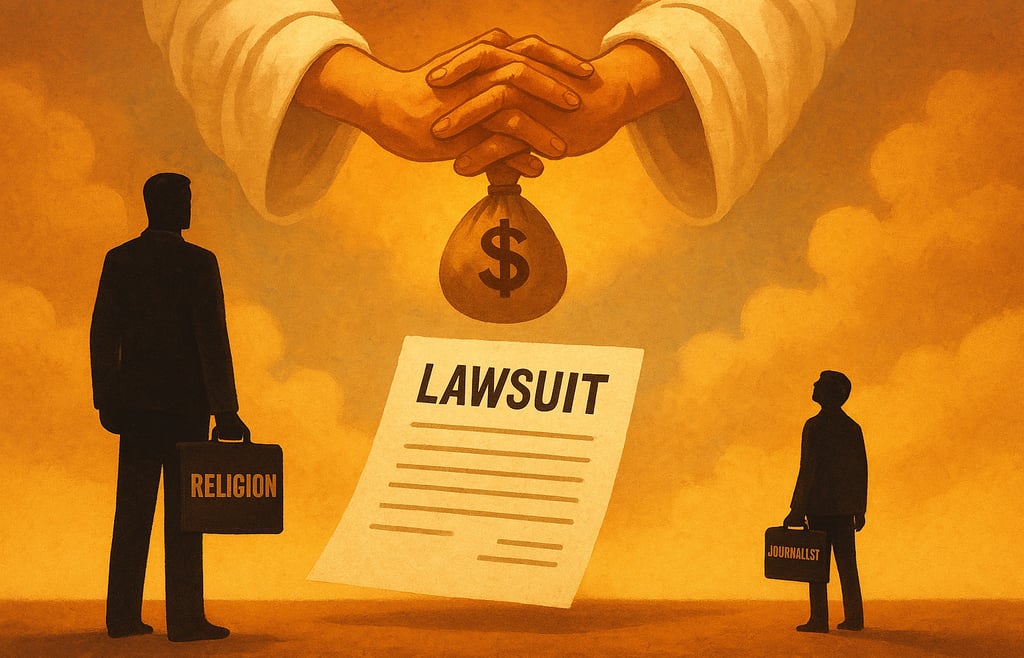“Leave It in Jehovah’s Hands?” — The Hypocrisy of Suing a Whistleblower
Jehovah’s Witnesses teach their followers to avoid “worldly courts” and trust that God will handle matters in his own time. But when their reputation is on the line, the organization turns to secular lawsuits and outside lawyers. This post unpacks the contradiction — and what it reveals about their true priorities.
TTATTFEATURED ON HOMEPAGE
Oliver
5/18/20253 min read


Jehovah’s Witnesses are taught to avoid the courts. To turn the other cheek. To trust that Jehovah will set things right. If someone wrongs you, you don’t take them to court, you leave it in Jehovah’s hands.
Unless, apparently, you're the Watchtower organization. Then, it seems, the rules change.
Right now, Jehovah’s Witness congregations — represented not by their own spiritual shepherds, but by outside secular attorneys from the law firm Cohen Seglias Pallas Greenhall & Furman PC — are suing Mark O’Donnell, a journalist and advocate who has spent years exposing how the organization handles child sexual abuse. They’re not just seeking an apology or correction. They’re seeking millions in damages.
Yes, you read that right. The same organization that tells its members to stay out of “worldly” courts has gone full legal scorched-earth. They're suing O’Donnell for more than $700,000 — and that figure appears to apply to just one of the claims. There are multiple counts in the complaint. If they win, the damages could easily total in the millions.
They know Mark doesn’t have that kind of money. That’s not the point. This isn’t about restitution. It’s about ruin.
And the contradiction here is staggering.
The Courtroom of Caesar
Watchtower teaches that worldly governments and courts are part of Satan’s system. They say God has permitted them to exist for now, but that true Christians avoid relying on them for justice. Members are discouraged from suing others, especially fellow believers. They’re told to settle disputes within the congregation or to “wait on Jehovah.”
But when a journalist exposes their institutional secrets? When someone shines a light on their decades-long pattern of shielding child abusers from accountability?
Suddenly, Caesar’s courtroom is just fine. Suddenly, it’s not about “turning the other cheek” — it’s about silencing the messenger.
And they don’t even try to hide the fact that they’re using secular lawyers to do it. The attorneys in this case, Edward Seglias and Ashling Ehrhardt, aren’t from Watchtower’s in-house legal department. They’re not elders or spiritual men. They’re outside professionals who make their living representing powerful institutions.
That’s a choice. A strategic one. And it reveals what this case is really about.
What Will They Do With the Money?
Let’s imagine the worst-case outcome. Let’s say Watchtower wins. Let’s say Mark O’Donnell is ordered to pay over a million dollars. He’s bankrupted. Silenced. Punished.
Then what?
Will the Watchtower take that money and use it to help the survivors of child abuse whose stories Mark helped bring to light?
Will they fund trauma counseling? Create independent safeguarding policies? Open their internal abuse files to law enforcement?
Will they make public apologies and begin to repair the damage?
Of course not. Because doing that would mean acknowledging the very abuse that Mark is trying to expose. And that’s what they’re fighting so hard not to do.
So what will they do with the money?
They’ll say it’s “for Jehovah.” They’ll say it’s “to protect God’s name.”
But let’s be honest: God doesn’t need hush money.
An all-powerful, all-knowing deity isn’t scrambling for legal fees. He doesn’t need punitive damages to clear his reputation. He doesn’t need to destroy a whistleblower’s life to prove his holiness.
Only corporations behave that way.
“Don’t Prepare Your Defense…”
Here’s another contradiction. Jesus told his followers that when they’re dragged before courts and rulers, they shouldn’t worry about preparing their defense in advance — that the holy spirit would teach them what to say. (Luke 12:11–12)
Watchtower hasn't shied away from using this verse in their publications. They love telling stories of “faithful brothers” who stood firm without legal training and gave courageous witness under pressure.
But when they go to court? Suddenly, it’s subpoenas and depositions and expert attorneys. Suddenly, it’s no longer about faith — it’s about legal firepower. About leveraging the system they claim to be separate from.
The Bigger Picture
This lawsuit isn’t just about Mark O’Donnell. It’s about sending a message: “We will come after you if you expose us.” It’s a warning to whistleblowers. To journalists. To anyone with knowledge of internal wrongdoing.
And it's working because it looks spiritual to the outside world. A big religious institution, suing a so-called “apostate” for leaking confidential information. They’ll spin it as a righteous defense.
But inside the organization, most Witnesses have no idea this lawsuit is even happening. It’s never been mentioned on JW.org. Never addressed publicly. And if it is, it’ll be dismissed as “apostate lies” or “protecting Jehovah’s name.”
But maybe — just maybe — this case will open a few eyes.
Maybe some will ask:
If we’re supposed to avoid courts, why is the organization suing someone?
If this man is lying, why not refute him with facts?
If we’re truly about forgiveness, why destroy him financially?
And maybe they’ll wonder:
What kind of religion defends its reputation harder than it protects its children?
